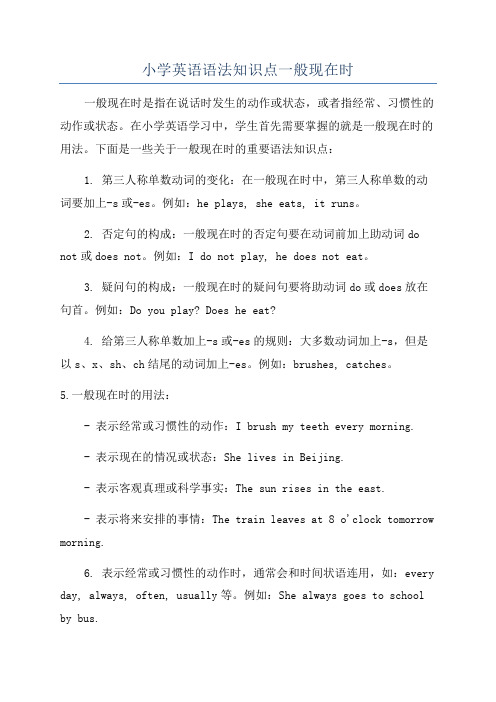小学英语一般现在时
小学英语语法课件一般现在时

Game Time:找出第三人称单数
he
apples
Amy bread
Gack
Mike and Sarah China
Game Time:找出第三人称单数
he
my father
Mike she
动词三单形式的变化规则
1 通常加s:like-likes cook-cooks play-plays 2 以s,x,ch,sh结尾的动词,加es: watch-watches wash-washes 3 以辅音字母加y结尾的动词,去y加ies
1. We often __pl_a_y__(play) on the playground at weekends. 2. He ___g_et_s__( get) up at six every day. 3. My father__b_r_us_h_e_s__ (brush) teeth twice a day. 4. The bread _lo_o_k_s__(look) nice. 5.Danny __s_t_u_di_e_s___(study) English, Chinese, math and art at
你每天通常几点起床?
一般现在时的概念
2.表示主语具备的 性格, 能力 ,和特征 (1)Steven is very tall. Steven非常高。 (2)Wendy plays basketball very well.
Wendy 打篮球打的很好。
一般现在时的概念
3.表示客观的状态或事实: (1)The earth moves around the sun. 地球围绕着太阳转 (2)Shanghai is in the east of China. 上海在中国的东边。
小学英语语法一般现在时总结

千里之行,始于足下。
学校英语语法一般现在时总结学校英语语法一般现在时总结一般现在时是英语中最基础和最常用的时态之一,它用来表达经常性的、重复性的或普遍性的动作或状态。
在学校英语学习中,同学们需要把握一般现在时的用法和构造。
一般现在时的构造:一般现在时的确定句的构造为:主语 + 动词原形(第三人称单数要加-s 或-es)+其他。
例句:I play football every day.He plays football every day.She watches TV on weekends.一般现在时的否定句的构造为:主语 + do not / does not + 动词原形 +其他。
例句:I do not play football every day.He does not play football every day.She does not watch TV on weekends.一般现在时的疑问句的构造为:Do / Does + 主语 + 动词原形 +其他?例句:Do you play football every day?Does he play football every day?Does she watch TV on weekends?一般现在时的用法:1. 表示经常性的动作或习惯。
第1页/共3页锲而不舍,金石可镂。
例句:I brush my teeth before going to bed.She always eats an apple in the morning.They usually walk to school.2. 表示普遍性的事实或真理。
例句:Water boils at 100 degrees Celsius.The sun rises in the east.Dogs are loyal animals.3. 表示现阶段的状态。
例句:I am a student.She is a teacher.They are happy.4. 描述行程支配或固定时间的动作。
小学英语语法一般现在时详细讲解

主语(I/We/You/They)+ do+not+动词原形+其他
如:I don’t stay at home on Saturdays. They don’t have sports every day.
主语(He/She/It)+ does+not+动词原形+其他
特殊疑问句: 疑问词+一般疑问句? 直接回答,而不用yes 或no.
5.一般现在时的句型变换 1) I usually play football on Friday. 改为一般疑问句: Do you usually play football on Friday? 对划线部分提问: What do you usually do on Friday? 2) My father go to work by bike everyday. 对划线部分提问: How does your father go to work everyday?
3. 表示永恒不变的真理;
The moon goes round the earth.
一. be动词的一般现在时
be动词: 主语 + be +其它
如:I am a boy. 我是一个男孩。问句:
4) 特殊疑问句: 疑问词+ do/does+主语+动词原形+其他? 如: What do you want? What does she want? What time do you have lunch? What time does she have lunch? What do you do? What does she do? How do you spell it? How does he spell it?
小学英语一般现在时

3. My birthday is on July 1st. Is your birthday on July 1st? When is your birthday?
--The birds don't fly . --The bird doesn't fly.
03
一般疑问句及回答
一般疑问句及回答
Do
+主语 (非单三)
+动词(短 语)原形
+其他?
肯定回 答
Do
you/they /we
like
apples?
Ye s , I / t hey/w e do.
Does
一般现在时
一般现在时分为两种:
一是含有be动词的一般现在时
二是含有实义动词的一般现在时
常
见
的 1. be动词:be动词是对am,is,are的统称
两
种
2. 实义动词:有实际意义的动词。eg:walk(走) swim(游泳)
run(跑)
动 动词还有其他的分 词 类,比如系动词、
助动词等,今天我
们只学习这两种。
2.含有实义动词的一般现在时 经常出现often、usually、sometimes这类的词
01. 肯定句 02. 否定句 03. 一般疑问句 04. 特殊疑问句
01
肯
定
句
主语(非 单三)
I/They
主语(单 三)
She/He
肯定句句子结构
+动词(短语)原形
+其他。
小学英语语法-一般现在时详细讲解

小学英语语法-一般现在时详细讲解一般现在时是英语语法中最基础也是最常用的时态之一。
它表示的是习惯性、经常性和普遍性的行为或状态。
在本文中,我将详细介绍一般现在时的形式、用法和注意事项。
一、一般现在时的形式一般现在时的肯定句的基本结构是:主语+谓语动词+其他。
谓语动词在第三人称单数形式时要加上-s或-es。
例如:- I eat breakfast every morning.(我每天早上吃早饭。
)- She goes to school by bus.(她坐公共汽车去学校。
)否定句的结构是:主语+do not/does not+动词原形+其他。
例如:- I do not like coffee.(我不喜欢咖啡。
)- He does not play football.(他不踢足球。
)疑问句的结构是:Do/Does+主语+动词原形+其他?例如:- Do you like ice cream?(你喜欢冰淇淋吗?)- Does she go to the park every weekend?(她每个周末去公园吗?)二、一般现在时的用法第1页/共4页1. 表示习惯或经常性的动作:- I write in my diary every night.(我每天晚上写日记。
)- They play basketball every Sunday.(他们每个星期天打篮球。
)2. 表示客观事实、自然规律或科学真理:- Water boils at 100 degrees Celsius.(水在100摄氏度时煮沸。
)- The sun rises in the east.(太阳从东方升起。
)3. 表示感觉、想法和喜好:- I love chocolate.(我喜欢巧克力。
)- He hates to wake up early.(他讨厌早起。
)4. 表示现时状态或现时临时的动作:- I am a student.(我是一个学生。
小学英语语法知识点一般现在时

小学英语语法知识点一般现在时一般现在时是指在说话时发生的动作或状态,或者指经常、习惯性的动作或状态。
在小学英语学习中,学生首先需要掌握的就是一般现在时的用法。
下面是一些关于一般现在时的重要语法知识点:1. 第三人称单数动词的变化:在一般现在时中,第三人称单数的动词要加上-s或-es。
例如:he plays, she eats, it runs。
2. 否定句的构成:一般现在时的否定句要在动词前加上助动词do not或does not。
例如:I do not play, he does not eat。
3. 疑问句的构成:一般现在时的疑问句要将助动词do或does放在句首。
例如:Do you play? Does he eat?4. 给第三人称单数加上-s或-es的规则:大多数动词加上-s,但是以s、x、sh、ch结尾的动词加上-es。
例如:brushes, catches。
5.一般现在时的用法:- 表示经常或习惯性的动作:I brush my teeth every morning.- 表示现在的情况或状态:She lives in Beijing.- 表示客观真理或科学事实:The sun rises in the east.- 表示将来安排的事情:The train leaves at 8 o'clock tomorrow morning.6. 表示经常或习惯性的动作时,通常会和时间状语连用,如:every day, always, often, usually等。
例如:She always goes to school by bus.7. 表示现在的情况或状态时,通常与be动词连用,如:am, is, are。
例如:I am a student.8. 表示客观真理或科学事实时,通常不和时间状语连用。
例如:Water boils at 100 degrees Celsius.9.一般现在时中的一些特殊用法:- 示意要求或建议的动词(如:want, need, like, love, hate等)后接不定式,用法类似于祈使句。
小学英语一般现在时的讲解和练习

小学英语一般现在时的讲解和练习一、一般现在时的构成一般现在时的构成非常简单,一般情况下,我们只需要在动词原形后面加上-s或-es 即可。
例如:I play basketball.(我打篮球。
)He studies English.(他学习英语。
)She watches TV.(她看电视。
)但是,还有一些特殊情况需要注意:如果动词以辅音字母+y结尾,将y变成i,再加上-es。
例如:study → studies, fly → flies。
如果动词以s、x、ch、sh或o结尾,加上-es。
例如:watch → watches, fix → fixes, teach → teaches。
如果动词以辅音字母+o结尾,加上-es。
例如:go → goes, do → does。
如果动词以元音字母+o结尾,加上-s。
例如:play → plays, enjoy → enjoys。
二、一般现在时的用法表示经常性的动作或习惯。
例如:I usually get up at 7 o'clock in the morning.(我通常早上7点起床。
)表示客观事实或普遍真理。
例如:The sun rises in the east.(太阳从东方升起。
)表示现在的状态或情况。
例如:He is a student.(他是一名学生。
)表示频繁或不断发生的动作或状态。
例如:She always sings when she is happy.(她开心的时候总是唱歌。
)表示说话人的观点或看法。
例如:I think English is an interesting language.(我认为英语是一门有趣的语言。
)三、一般现在时的练习选择正确的动词形式填空。
Tom _______ (like/likes) to play basketball after school.My mother _______ (cook/cooks) delicious food every day.The weather _______ (be/is) fine today.My sister _______ (read/reads) books every night before she goes to bed.The cat _______ (drink/drinks) milk every morning.答案:1) likes 2) cooks 3) is 4) reads 5) drinks用所给单词的适当形式填空。
小学英语语法时态讲解与归纳一般现在时

千里之行,始于足下。
小学英语语法时态讲解与归纳一般现在时一般现在时(Simple Present Tense)是表示经常性、习惯性或普遍性的动作或状态的时态。
它用于描述我们现在经常或总是发生的动作、习惯、经验、事实和固定的真理。
下面是小学英语语法时态讲解与归纳一般现在时的内容:1. 构成一般现在时的肯定句结构为:主语 + 动词原形(第三人称单数加-s)+ 其他。
例如:- I play soccer every Saturday.(我每个星期六踢足球。
)- She eats an apple every morning.(她每天早上吃一个苹果。
)2. 第三人称单数的变化在一般现在时中,第三人称单数的动词要加上-s、-es或-ies。
例如:- She plays soccer every Saturday.(她每个星期六踢足球。
)- He eats an apple every morning.(他每天早上吃一个苹果。
)- My brother watches TV every night.(我的哥哥每天晚上看电视。
)3. 否定句和疑问句第1页/共3页锲而不舍,金石可镂。
- 否定句:在动词前加do not(don't)或does not(doesn't)。
例如:- I don't play soccer every Saturday.(我不是每个星期六踢足球。
)- She doesn't eat an apple every morning.(她不是每天早上吃一个苹果。
)- 疑问句:将助动词do(does)提到主语前。
例如:- Do you play soccer every Saturday?(你每个星期六踢足球吗?)- Does she eat an apple every morning?(她每天早上吃一个苹果吗?)4. 频率副词频率副词用来修饰动词,表示动作发生的频率。
- 1、下载文档前请自行甄别文档内容的完整性,平台不提供额外的编辑、内容补充、找答案等附加服务。
- 2、"仅部分预览"的文档,不可在线预览部分如存在完整性等问题,可反馈申请退款(可完整预览的文档不适用该条件!)。
- 3、如文档侵犯您的权益,请联系客服反馈,我们会尽快为您处理(人工客服工作时间:9:00-18:30)。
小学英语一般现在时
一. 意义:表示经常发生的事情,动作或存在的状态
二. 构成及变化
1.be动词的变化。
肯定句:主语+be(am,is,are)+其它。
如:I am a boy.我是一个男孩。
否定句:主语+ be + not +其它。
如:He is not a worker.他不是工人。
一般疑问句:Be +主语+其它。
如:-Are you a student? -Yes. I am. / No, I'm not.
特殊疑问句:疑问词+一般疑问句。
如:Where is my bike?
2. 行为动词的变化。
l、当主语为第一,二人称及复数时,助动词为do
肯定句:主语+动词原形(+其它)。
如:We often play basketball after school.
否定句:主语+ don't+动词原形(+其它)。
如:we don’t play basketball after school.
一般疑问句:Do +主语+动词原形+其它?
如: Do you often play basketball after school l? Yes, we do. / No, we don't.
特殊疑问句:疑问词+以do开头的一般疑问句?
如: What do you often do after school ?
2、当主语为第三人称单数时 ,
助动词为does
肯定句:主语+动词三单式(+其它)。
如: He swims well.
否定句:主语+ doesn’t+动词原形(+其它)。
如:He doesn’t swim well..
一般疑问句:Does +主语+动词原形+其它。
如:Does he swim well ?
Yes, he does. / No, he doesn't.
特殊疑问句:疑问词+以does开头的一般疑问句?
如: How does your father go to work?
三.第三人称单数的动词变化规则(只有在第三人称为主语的肯定句中,动词才用三单式)(1)多数动词直接加s: runs gets likes collets takes plays climbs…….
(2)结尾是s, x, sh, ch, o,前为辅音字母,
结尾加es : watches teaches goes does washes crosses mixes brushes
(3)动词末尾y前为辅音:将y改为i加es: study→studies fly→flies
carry→carries
cry→cries
但在y前如果为元音则直接加s: buys says
四.时间标志:always , usually , often , sometimes ,every…
一般现在时练习题(1)
I.用下列单词的适当形式填空
1.We often___________(play) in the playground.
2.He _________(get) up at six o’clock.
3.__________you _________(brush) your teeth every morning?
4.What________________(do) he usually________________(do) after school?
5.Danny ________________(study) English, Chinese, maths, science and Art at school.
6.Mike sometimes __________(go) to the park with his sister.
7.At eight at night, she __________(watch) TV with his parents.
8.________ Mike________(read) English every day?
9.How many lessons_________your classmates________(have) on Monday?
10.What time_________his mother_________(do) the housework?。
